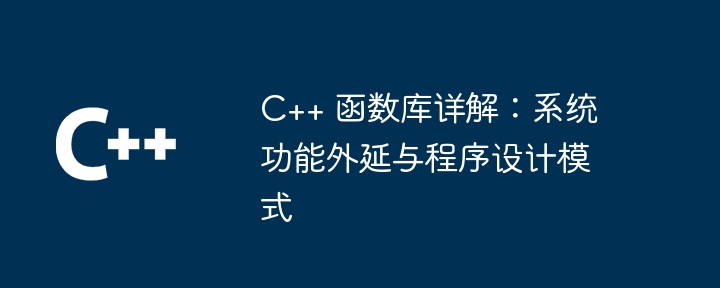
The function library of the C standard library simplifies software development through system function extensions and programming patterns. These function libraries include: Container library: Provides dynamic data structures for storing and managing data. Iterator library: Provides a unified interface for accessing and traversing elements in a container. Algorithm library: Provides general algorithms for operating data structures. Utility library: Provides functions for performing common tasks such as time processing and file operations.

Detailed explanation of C function library: system function extension and programming pattern
Introduction
The C standard library provides a rich series of function libraries that simplify software development by extending system functions and application design patterns. This article will take an in-depth look at these function libraries and their practical applications.
Container libraries
Container libraries (such asvector,mapandset) provide Dynamic data structures for storing and managing data. With containers, we can efficiently manage large data sets without having to manually track memory allocation and deallocation.
Iterator library
The Iterator library provides a unified interface for accessing and traversing elements in a container. Iterators allow sequential access to elements without knowing the actual implementation of the underlying container.
Algorithm libraries
Algorithm libraries (such assort,findandcopy) provide General-purpose algorithms for manipulating data structures. These algorithms can reduce the amount of duplicate code and improve code maintainability.
Utility libraries
Utility libraries (such asctimeandcstdio) provide functions for performing common tasks , such as time processing and file operations. These functions simplify everyday programming tasks.
Practical Example: Linked List Reversal
Consider the following example of reversing a linked list using thestd::reversealgorithm:
#include#include #include
int main() { // 创建一个链表 std::list my_list{1, 2, 3, 4, 5}; // 使用 std::reverse 反转链表 std::reverse(my_list.begin(), my_list.end()); // 打印反转后的链表 std::cout << "Reversed list: "; for (int num : my_list) { std::cout << num << " "; } std::cout << "\n"; return 0; }
Output:
Reversed list: 5 4 3 2 1
Programming Pattern
In addition to the function library, the C standard library also provides programming patterns. These patterns provide proven solutions to common programming problems, such as:
Conclusion
The C standard library is a powerful set of tools that simplify software development by extending system functionality and application design patterns. Understanding and leveraging these libraries and patterns is critical to writing efficient, maintainable, and scalable code.
The above is the detailed content of Detailed explanation of C++ function library: system function extension and programming pattern. For more information, please follow other related articles on the PHP Chinese website!
 What are the differences between c++ and c language
What are the differences between c++ and c language Recommended learning order for c++ and python
Recommended learning order for c++ and python Cost-effectiveness analysis of learning python and c++
Cost-effectiveness analysis of learning python and c++ Is c language the same as c++?
Is c language the same as c++? Which is better to learn first, c language or c++?
Which is better to learn first, c language or c++? The difference and connection between c language and c++
The difference and connection between c language and c++ C++ software Chinese change tutorial
C++ software Chinese change tutorial Cost-effectiveness analysis of learning python, java and c++
Cost-effectiveness analysis of learning python, java and c++



